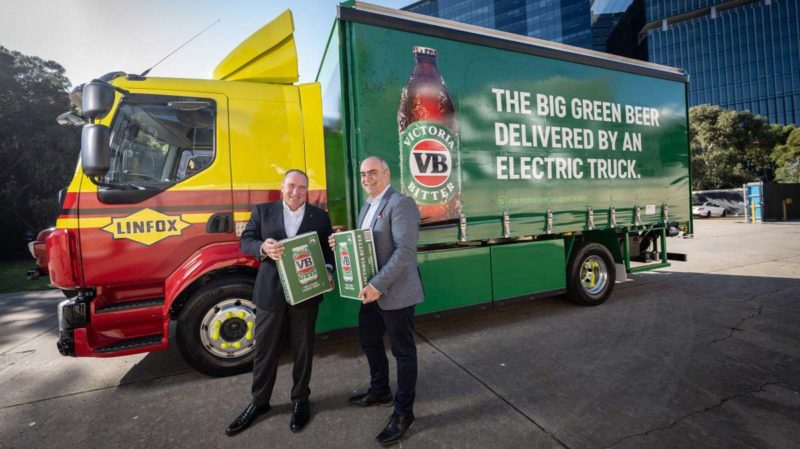Iconic Australian beer brand Victoria Bitter is now delivering – quite literally – its clean and green message in the form of a zero-emissions Volvo FL electric truck.
Newly-decked out in Victoria Bitter’s instantly recognisable green, trucking company Linfox will use the Volvo electric truck to transport more than 100,000 can and stubbies of the liquid amber brew from Asahi Beverages’ distribution centre in Melbourne’s west.
With up to 250km driving range, the Volvo electric truck will be powered entirely from 100% renewable sources thanks to an energy purchasing deal cut in 2019 to buy output from the 112MW Karadoc solar farm in Mildura in Victoria.
The Volvo FL is the first purely electric truck from the brand to reach Australian shores. It was such a momentous occasion that its arrival drew a visit from prime minister Scott Morrison who sat behind the wheel, remarking, “See you in Canberra.” (It was not, however, important enough for the PM’s office to post footage or images at the time.)
Asahi Beverages, Volvo Trucks and Linfox by contrast have expressed the importance of reaching for sustainable targets.
“Linfox has delivered VB for more than 50 years. It’s fitting these two Australian icons are taking this major step towards a sustainable future together,” said Robert Iervasi, group CEO of Asahi Beverages which purchased Carlton & United Breweries last year, in a statement.
“This truck will deliver VB and our other beers in a sustainable, safe and efficient way, which makes sound commercial sense.”
Iervasi says the Volvo FL truck is just the first of many to come, as the company works towards its sustainability goals: “It is the first of many electric trucks that will deliver our beer. Transitioning our deliveries to electric vehicles will help us achieve our ambitious sustainability goals of reducing our net carbon emissions across our entire supply chain by 30% by 2030 and to zero by 2050.”
Linfox executive chairman Peter Fox said according to B and T: “Australia’s domestic freight task has doubled in the past decade and will continue to grow. To meet this demand, Australia’s road fleet will also grow and it is essential the fleet does this safely, efficiently and with reduced environmental impact.
“We are proud to introduce Volvo’s first electric vehicle in Australia to the Linfox fleet. The majority of Linfox’s carbon emissions come from transportation tasks. As we continue our journey to act sustainably and achieve zero net emissions by 2030, the way we operate will change in response, with more electric vehicles planned for our fleet and increased use of rail transport where viable. “
Volvo Group, which forms the umbrella of its car, truck, bus, construction equipment and marine power brands, has set an ambition to be fossil fuel free by 2040, and Volvo Cars, which is owned by Chinese car group Geely, has committed to sell only electric cars from 2030, saying there is “no future for ICE“.
“The transport industry is transforming at a rapid rate,” said Volvo Group Australia president and CEO Martin Merrick in a statement.
“Electromobility is rapidly gaining traction as a transport solution and we are proud to partner with Linfox and Asahi Beverages on this exciting new journey.
“Environmental care is a core value shared not only by Linfox and Volvo Trucks but also by Asahi Beverages and we are proud of those shared values. We are committed to ensuring our vehicles will play their part in making our cities cleaner and more liveable,
“This new truck represents the first step on that journey.”
Bridie Schmidt is lead reporter for The Driven, sister site of Renew Economy. She has been writing about electric vehicles since 2018, and has a keen interest in the role that zero-emissions transport has to play in sustainability. She has participated in podcasts such as Download This Show with Marc Fennell and Shirtloads of Science with Karl Kruszelnicki and is co-organiser of the Northern Rivers Electric Vehicle Forum. Bridie also owns a Tesla Model 3 and has it available for hire on evee.com.au.
By
Source: https://thedriven.io





